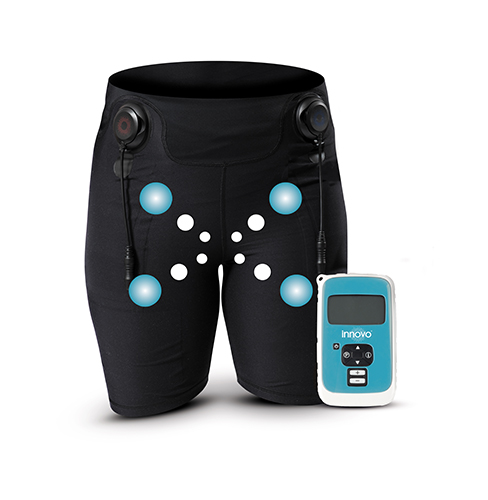Post-natal fitness expert Jane Wake explains how to target and strengthen your pelvic floor.
Pregnancy and birth bring with them a whole heap of side effects, including an uproar of hormones, a growing belly and, eventually, your beautiful baby. However, other symptoms can rear their ugly head during this time, such as a weakened pelvic floor, which can lead to bladder weakness. In fact, pregnancy can worsen the issue due to pregnancy hormones relaxing the muscles and the pressure the baby can put on the bladder and the pelvic floor for nine months. As a result, urinary leaks are common, especially with post-pregnancy constipation which can overstretch the pelvic floor muscles.
What is bladder weakness?
Bladder weakness is as common as hay fever, affecting 5.4 million women in the UK. Bladder weakness, urinary incontinence, little accidents, whatever you choose to call them, can commonly happen when we cough, sneeze, laugh, jump or feel a sudden urge and have to go straight away. INNOVO® studies revealed that it could have a significant impact on women’s lives both physically and psychologically. The new INNOVO® shorts can change your life in just four weeks by strengthening your pelvic floor and reducing the chances of urinary leakage or prevent them altogether. Regardless of whether you have a weakened pelvic floor or not, you should get into the habit of exercising your pelvic floor muscles, several times during the day, every day. Here Jane Wake, a female fitness professional, pelvic floor expert and INNOVO ® spokeswoman, explains how to check you are doing it right.
Locate your muscles
The pelvic floor muscles start from your pubic bone and run through to the tailbone at the back. Imagine stopping the wind from your back passage and then stopping a wee from the front. You then pull these two points in and up together. Doing it this way will help you to learn where they are and help you connect to them better if you do get problems.
Recruit all your floor
Imagine that you are pulling your pelvic floor muscles up through five floors – like a lift going up. Then, you go back down through the levels before you lift up again. INNOVO® can help you work all the muscles of your pelvic floor so that you can feel this lift, delivering 180 perfect contractions in each 30-minute session.
Work your pelvic floor the hardest
Focus on your pelvic floor muscles when exercising, so that they can strengthen over and above the other muscles that tend to take over, like the glutes (the bum) and the abs. It may be tricky to home in on just the pelvic floor when you are practising your exercises, so INNOVO® can help.
Don’t hold your breath
Holding your breath creates tension in the body that can cause pressure, increasing stress to some muscles including the pelvic floor. While you are exercising your pelvic floor, take deep breaths and, as you exhale, try to relax and feel your pelvic floor.
A fail-safe solution
Studies have shown that 50 per cent of women cannot activate their pelvic floor properly. So a fail-safe solution to ensure is to use INNOVO® shorts, the first and only non-invasive, long-lasting solution to treat the root cause of bladder weakness. They send targeted impulses to the entire pelvic floor via electrodes in the fabric. INNOVO® delivers 180 perfect contractions of the pelvic floor in a 30-minute session, ensuring the whole pelvic floor is exercised.
INNOVO® recommended treatment involves completing five 30-minute sessions per week for 12 weeks. No one wants to wear pads, and now there is no reason why you should put up with the symptoms of bladder weakness!
For more information visit restorethefloor.com.

What is innovo?
INNOVO® is the non-invasive, at-home treatment for the cause of bladder weakness. It comfortably and effortlessly strengthens the entire network of pelvic floor muscles via Electrical Muscle Stimulation (EMS) technology. It provides an effective and lasting solution to prevent leaks. The new INNOVO® is comfortable and very easy to use, and is clinically proven to work!
- 93% of users had significant reduction in leaks after just 4 weeks








